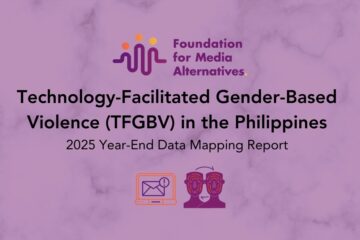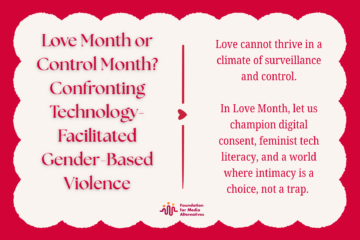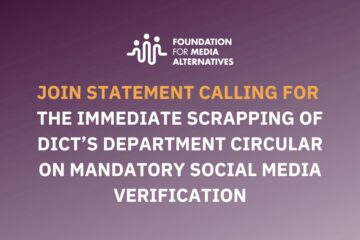On the nation’s digital landscape, online propaganda, and the fight against historical distortion: The FMA Digital Rights Roundup
October 1-15, 2021
The Digital Rights Roundup, published by the Foundation for Media Alternatives, contains regular updates on what Filipinos need to know about their digital rights.
Philippines’ digital competitiveness slips
The Philippines dropped three spots in IMD business school’s World Digital Competitiveness Ranking 2021. The country fell to 57th place in 2020 from 55th a year earlier. It retained the 13th spot among the 14 Asia-Pacific economies measured. American Chamber of Commerce of the Philippines calls the decline “very concerning”. Read more here.
DICT putting up supplemental ‘resiliency route’ for Nat’l Broadband Program
The Department of Information and Communications Technology (DICT) said it is accelerating the build-out of a supplemental infrastructure, called the “resiliency route”. The resiliency route is expected to support and initially benefit the country’s metropolitan centers for commercial, financial, and administrative activities. Read more here.
Mobile number portability a go on Sept. 30, but expect hiccups
Telecommunications Connectivity Inc. (TCI) said number portability services will be rolled out by the Sept. 30 target, but some features may not be immediately available. It will allow subscribers to easily shift between telco providers and plans without having to change their mobile numbers. Read more here.
Army just ‘surfing,’ not attacking news site—Biazon
This was how Muntinlupa Rep. Ruffy Biazon, quoting the Philippine Army, countered the accusation that one of the Army’s internet protocol (IP) addresses was behind the cyberattacks on the alternative news website Bulatlat.com. Biazon said the Army had investigated the matter and concluded that the IP address in question—202.90.137.43—only engaged in “surfing activity” of less than a minute. Read more here.
FDA warns public vs branded COVID vaccines allegedly sold online
The FDA has warned the public against buying branded coronavirus disease (COVID-19) vaccines sold on online selling platforms and social media. Based on its advisory dated September 30, the agency said the scheme is a “scam” used to attract buyers with preferred brands like AstraZeneca, Pfizer, and Moderna. The agency reminded the public that only authorities may administer the use of vaccines, for now. Read more here.
Bank warns public vs fund transfer scams
Cybercriminals become more adept at phishing, or stealing credentials to access bank accounts. Security Bank warned of phishing emails disguised as fund transfer notifications from Instapay or Gcash or online banking emails. Account holders are urged to hover over the link or button for a preview of the actual URL provided in the email before clicking and pursuing a transaction. Read more here.
YouTube blocks all anti-vaccine content
YouTube is moving beyond its ban on false information about the COVID vaccines to include content that contains misinformation about other approved vaccines. The online video company owned by Alphabet Inc (GOOGL.O) is also banning channels associated with anti-vaccine activists including Robert F. Kennedy Jr. and Joseph Mercola. Read more here.
Gordon flags ‘fake news’ websites as Senate continues pandemic fund probe
The public must be more cautious of “fake news” and clickbait headlines on social media, Senator Richard Gordon said Sunday. The Senate is investigating the alleged mismanagement of pandemic funds. Some pro-administration social media accounts claimed he “folded and apologized to the President,” Gordon said. Read more here.
Internet is new battleground to check false narratives on Marcos regime – commission
The current learning setup under the COVID-19 pandemic presents a “good opportunity” to teach young students about the realities of martial law, an official said. The Human Rights Violations Victims Memorial Commission (HRVVMC) was created in 2013 to grant reparations and recognition for the victims. Part of its mandate is to correct collective memory about what happened between 1972 to 1986. Read more here.
New war: How the propaganda network shifted from targeting ‘addicts’ to activists
The National Task Force to End Local Communist Armed Conflict (NTF-ELCAC) is at the center of a network of Facebook pages and groups pushing out red-tagging content. A mix of old and new bloggers, as well as “alternative” news sources spread these narratives through different clusters that push out content either to the general public or to niche but highly-engaged communities. They drown out the real stories of activists being harassed, attacked, and killed. Read more here.
P42-B gadgets, internet sought for poor students
The number of students enrolled for the current school year is at 28.2 million, or 107.6 percent compared to last year’s record. The amount will cover gadgets worth P6,000 per unit and a monthly internet allowance of P150 per learner. The Alliance of Concerned Teachers (ACT) said the increase in the number of enrollees shows the youth’s eagerness to learn and go back to school and urged the Department of Education (DepEd) to immediately provide gadgets and internet support worth P42 billion to indigent learners. Read more here.
Teachers, DepEd personnel urged to sign up for PNPKI for 2022 polls
The Department of Education (DepEd) is urging teachers and personnel who have not yet signed up for the Philippine National Public Key Infrastructure (PNPKI) to register before September 30, 2021. The PNPKI digital signature is a new requirement by the Commission of Elections (Comelec) for all public school teachers who will serve as Electoral Board Members. It lets its users encrypt or conceal data into a code and embed important transactions like email exchange in order to protect it from hackers. Read more here.
Drilon questions legality of PCOO’s social media office
Senate Minority Leader Franklin Drilon questioned the legality of the creation of a social media office under the Presidential Communications Operations Office (PCOO). An office can only be created through law, Drilon said during the PCOO’s budget hearing in the Senate. PCOO Undersecretary Kris Ablan confirmed that the agency created the said office in 2017. Read more here.
NTC asked to shut down internet provider accused of having no license
Former congressman Terry Ridon is asking the National Telecommunications Commission (NTC) to stop the operations of a little-known company providing fiber internet services. Horizon Gateway Corp., which provides services under the Horizon Fiber brand, was doing business without government licenses. The company has yet to respond to an Inquirer request for comment sent through its website. Read more here.
Honasan quits post as DICT chief to run as senator
Gregorio “Gringo” B. Honasan II filed on Friday, Oct. 8, his certificate of candidacy for senator in the 2022 elections, effectively resigning from the DICT. Undersecretary Jose Arturo “Brady” de Castro has reportedly been designated as officer-in-charge pending the announcement of a new secretary. Honasan’s two-year run as DICT head was lackluster and controversial, with his promise of bringing the local ICT industry closer to the national agenda ending in a big disappointment. Read more here.
Smart asks NTC to clarify GOMO’s delay in MNP compliance
PLDT-owned operator Smart Communications has urged the National Telecommunications Commission (NTC) to look into why Globe Telecom’s GOMO had failed to take part in the Mobile Number Portability (MNP) launch. “Even the President of the Philippines cannot stop the law from being implemented,” said Smart regulatory affairs manager Kenneth E. Regañon. Read more here.
E-payment transactions breach BSP’s 20% target
The share of digital payments to total retail transactions topped 20 percent last year as the pandemic served as a catalyst to digitalization, the Bangko Sentral ng Pilipinas said. The increase was traced to the 47.8 percent jump in payments to merchants, 18.1 percent rise in person-to-person (P2P) payments, and the higher payments made by government institutions for salaries and payrolls. Read more here.
Senate website hit by cyber attack amid ongoing probe
Access to the Senate website temporarily blocked due to ongoing distributed denial-of-service (DDoS) attack. The same cyber attack also hit the official website of Senator Richard Gordon last Oct. 4. DDoS attack is an attempt to make an online service or website unavailable by overwhelming it with internet traffic from multiple sources. Read more here.
NPC warns public against ‘smishing’
The National Privacy Commission (NPC) is looking into reports of smishing or phishing carried out through unsolicited text messages. Smishing occurs when mobile users receive text messages that trick them to click on links to malicious websites. The NPC is reminding the public to be vigilant against cybersecurity attacks. Read more here.
#NeverAgain: Voters urged to stop Marcos’ revision of PH history, return to Malacañang
Bongbong Marcos announced Tuesday that he would be running for president in 2022. Various groups have urged voters to block the Marcoses’ return to Malacañang. The year 2022 marks the 50th anniversary of martial law. Opposition coalition 1Sambayan called on the people to be more vigilant and avoid being misled by lies. Read more here.
Philippine Nobel winner Ressa calls Facebook ‘biased against facts’
Philippine journalist Maria Ressa criticises Facebook as a threat to democracy. She says the social media giant fails to protect against the spread of hate and disinformation. Ressa shares the Nobel Peace Prize with Russian journalist Dmitry Muratov for exposing corruption and misrule. Read more here.
Text blasting machines illicitly sold; ‘weaponized’ by pols
The National Telecommunications Commission (NTC) said it would run after sources of illegal radio gear such as text blast machines. Devices are widely available in leading e-commerce portals such as Carousell, Facebook Marketplace, Lazada, and Shopee. Most of the sites started removing products starting Oct. 8 after they learned about the probe in the media. Read more here.
23 Philippine kids rescued from sexual predators
A 61-year-old Victorian man was sentenced to four years and one month imprisonment. He pleaded guilty in March to five child abuse offences, which included trying to procure a 14-year old girl for sexual activity during a trip overseas. The Australian Federal Police-led operation led to investigations carried out by the Philippine National Police. Read more here.
Ano’ng Konek? The Podcast is here!
You can listen for free on Spotify through this link.
For our Episode 0, get to know the initiatives of the Foundation for Media Alternatives in pushing for human rights in a digital world. FMA Executive Director Lisa Garcia and program officers Thina Lopez and Jessamine Pacis will give us an overview of FMA’s various desks and programs, as well as its work through the years.
Don’t forget to follow us on Spotify so you can stay updated on digital rights issues that we will discuss in the next episodes! Stay tuned!
This podcast is supported by Internews and USAID. The content of this podcast is the sole responsibility of the Foundation for Media Alternatives (FMA).
Subscribe to UP Internet’s telegram channel for latest news and updates at your fingertips.
The UP Internet Freedom Network (UP INTERNET) is an alliance of students and volunteers advocating for internet freedom. You may e-mail them at upinternet.org@protonmail.com for inquiries.
DOWNLOAD: On the nation’s digital landscape, online propaganda, and the fight against historical distortion: The FMA Digital Rights Roundup (1-15 October 2021)
All resources here are linked to the original websites. If any of the resources will be used otherwise, please do credit the source.



0 Comments